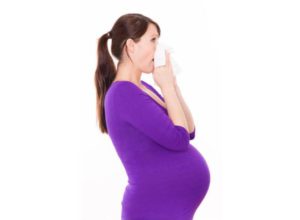The difference between vasomotor rhinitis during pregnancy and a common rhinitis – how to treat rhinitis in a pregnant woman?
 For any woman, the joy of motherhood is the most pleasant and memorable emotions. But the period of gestation is always accompanied by anxiety – both for your health and for the unborn baby. Moreover, in the presence of symptoms characteristic of a cold, which does not benefit anyone.
For any woman, the joy of motherhood is the most pleasant and memorable emotions. But the period of gestation is always accompanied by anxiety – both for your health and for the unborn baby. Moreover, in the presence of symptoms characteristic of a cold, which does not benefit anyone.
However, a runny nose (the very first sign of a cold) does not always indicate ARVI. There are other causes of nasal congestion.
The content of the article:
- Rhinitis Causes During Pregnancy
- Symptoms of vasomotor rhinitis – the difference from the common cold
- Diagnosis of vasomotor rhinitis in pregnant women
- Treatment of rhinitis during pregnancy
- Prevention of vasomotor rhinitis in a pregnant woman
All the causes of vasomotor rhinitis during pregnancy – why does nasal congestion and runny nose occur without a cold?
Few have heard the term “vasomotor rhinitis” (hereinafter – VR), but more than half of expectant mothers have encountered the phenomenon itself during pregnancy.
This term means a violation of nasal breathing of a non-inflammatory nature, mainly observed as a result of a hypertrophied reaction of blood vessels to a specific irritation.
This type of rhinitis has nothing to do with infectious rhinitis, but it still requires attention.
VR is manifested in every 2-3 expectant mothers – and, as a rule, in the 2nd half of pregnancy. Where does it come from?
Video: Rhinitis of pregnant women
The main reasons for the appearance of VR include:
- VSD and decreased vascular tone.
- Hormonal changes (in this case, pregnancy).
- Environmental factors. Air quality: too dirty, dry, hot or cold, smoky, etc.
- The use of aggressive household chemicals.
- Lack of proper cleaning in the room.
- Use of personal care products or perfumes.
- The presence of irritant components in food (flavor enhancers, various spices, etc.).
- Abuse of vasoconstrictor drugs.
- Increased meteosensitivity (approx. – probably, many have heard the expression “walking thermometer”).
- The specific structure of the nose itself.
- The presence of polyps or cysts in the nose.
- The consequences of the transferred viral rhinitis. That is, the viral rhinitis itself has already passed, but the regulation of vascular tone is disturbed.
- Severe stress. The release of hormones into the blood, which occurs during stress, provokes vasoconstriction.
- The presence of allergic diseases (asthma, dermatitis, etc.).
- Diseases of the gastrointestinal tract.

Signs and symptoms of vasomotor rhinitis in pregnant women – as opposed to a common cold for colds
The main symptom of BP is, as the name implies, nasal congestion. Moreover, unlike a common rhinitis, nasal congestion with VR may not go away with the use of conventional (for the common cold) drugs.
The congestion is sometimes noted so strong that it is possible to breathe only through the mouth. In the “lying” position, the intensity of the symptom usually increases, so you have to sleep reclining.
Also, vasomatous rhinitis is accompanied by the following symptoms:
- Feeling of pressure / bloating from the inside in the area of the nose.
- Ear pressure.
- The presence of itching in the ears and nose, itching of the eyelids.
- The presence of mucous discharge. Again, in comparison with a viral rhinitis, there is no “green snot” with BP – the discharge from the nose remains transparent and watery.
- Repeated sneezing.
- Puffiness of the eyes, signs of redness, watery eyes.
- An unproductive cough and even hoarseness may also occur.
Fever, headache, chills and the usual cold and viral rhinitis weakness with BP is usually not observed. An exception is if VR occurs simultaneously with another disease.

Do I need a diagnosis for vasomotor rhinitis in pregnant women?
Possible complications and consequences of VR include:
- The transition of the disease to a chronic form.
- Increased risk of catching a cold due to constant mouth breathing.
- Accession of a secondary infection and the development of bacterial rhinitis / sinusitis.
- Polyp formation.
- Hearing impairment.
Based on the foregoing, it is important to diagnose the disease in a timely manner and begin treatment, taking into account the fact of pregnancy. You should, of course, contact the ENT.
Diagnostics includes:
- Collecting anamnesis.
- General inspection.
- Rhinoscopy.
- Laboratory diagnostics. Namely, a general blood test (check the level of eosonophils, immunoglobulin E), allergy tests, immunogram, culture from the nasopharynx, X-ray of the sinuses.

Treatment of vasomotor rhinitis during pregnancy – is it possible to use drops, what to use at home to relieve symptoms, what remedies will the doctor prescribe?
BP treatment depends on the form of the disease and stage, as well as the general clinical picture, the presence of concomitant diseases, etc.
It is important to note that vasoconstrictor drops in this case will only aggravate the situation, and self-administration of drugs is too dangerous during pregnancy.
It is highly recommended to consult a specialist for diagnostics and for prescriptions.
So what is the treatment for BP in pregnancy?
- The most important point: elimination of the factors provoking these attacks of VR… Unfortunately, it is impossible to change the environment near your home, but everyone can install an air purifier at home. If BP is provoked by too dry air, take an air purifier with a humidification function. We change cosmetics and perfumes to safe ones, purchase eco-friendly household chemicals or switch to “old-fashioned methods” (soda, laundry soap, mustard), and regularly carry out wet cleaning in the apartment. If the BP is provoked by pets, they will have to be relocated.
- Sanitation of the nasal cavity. With BP, regular flushing of the nasal passages often helps relieve swelling of the mucous membranes, so do not ignore this wonderful method. Specialty saline solutions can be purchased at the pharmacy or you can use traditional saline solution. The number of washes is 4-6 times a day. Washing methods: instillation, washing through a syringe or other devices (in particular, through a pharmaceutical preparation), irrigation of the nose with preparations based on sea salt (aquamaris, aqualor, afrin, etc.).
- Use of acceptable antiallergic drugs as prescribed by a doctor.
- Taking vitamins A, C and E, Omega complex, etc.
- Physiotherapy. Some types of physiotherapy are prohibited in the early stages of pregnancy, but in general the “interesting position” is not a contraindication in this case. For the treatment of BP are shown: phonophoresis and electrophoresis, daily for one and a half weeks.
- Breathing exercises: three times a day, daily for a month.
- Competent organization of the sleep schedule – and the sleeping place itself… Sleep in a clean, ventilated room, on a headboard raised 40 degrees.
- Using a nebulizer for inhalation. Important: steam inhalation during pregnancy is strictly prohibited!
Video: Features of the treatment of a common cold in pregnant women
Usually, with proper treatment, BP goes away completely already on the 7-10th day. If the disease is chronic, there can be two solutions – conservative or using a laser technique.
Prevention of vasomotor rhinitis during pregnancy
To prevent the development of vasomotor rhinitis, the following measures should be taken:
- Strengthen immunity.
- Maintain order, clean air and a certain humidity in the apartment.
- Avoid encounters with possible allergens. During pregnancy, it is recommended to replace the usual household chemicals and “fragrant” hygiene products with safe and environmentally friendly ones.
- Observe the regime of the day, food, walks.
- Limit contact with sick people.
- See your doctor regularly.
- To cultivate an optimist in yourself. Positive emotions often become one of the best medicines in the treatment of all diseases. And stress, in turn, provokes many diseases.
- Get into the good habit of doing gymnastics, including breathing.
- Contact an allergist if your body has ever reacted to anything with an allergy, in order to know exactly what exactly can provoke an allergy.
- Train the vessels – temper, do (again) gymnastics, eat healthy foods (slave and vegetables, legumes, gelatin, fruits and berries), sleep according to the schedule and at least 8 hours, refuse junk food and drinks.
- Healthy food. That is, a minimum of cholesterol, a maximum of vitamins, amino acids, calcium. The food temperature should be as comfortable as possible.
- Monitor your weight.
All information in this article is for educational purposes only, it may not correspond to the specific circumstances of your health, and is not a medical recommendation.
The сolady.ru website reminds you that you should never delay or ignore your visit to a doctor!
What to give a friend?
Gift Certificate! You can give it to your loved one or use it yourself.
And we also give away a certificate for 3000 rubles every month. among new email subscribers. Subscribe!
Select a certificate in the store
Visit Bologny for more useful and informative articles!




